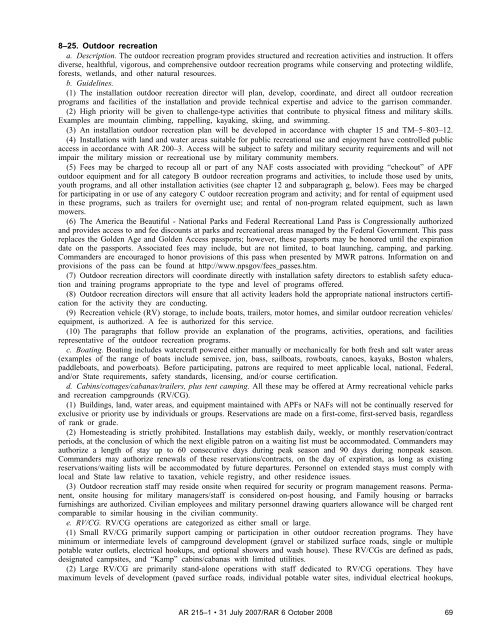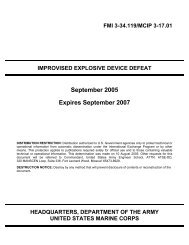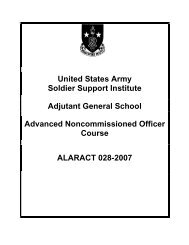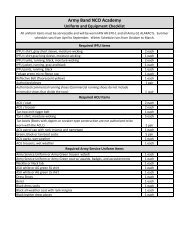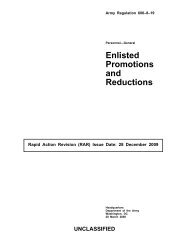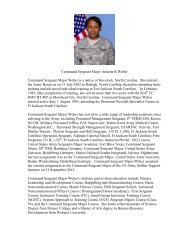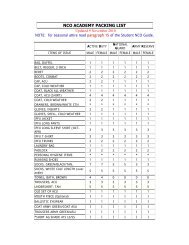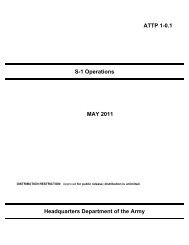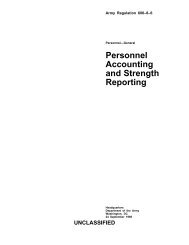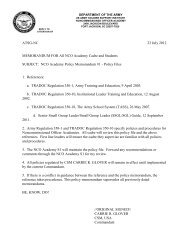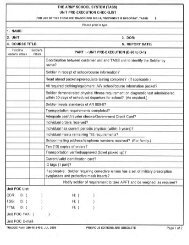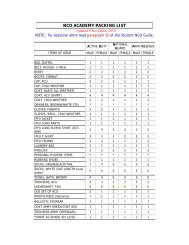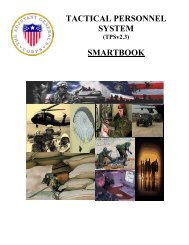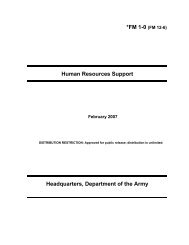AR 215-1 - Soldier Support Institute - U.S. Army
AR 215-1 - Soldier Support Institute - U.S. Army
AR 215-1 - Soldier Support Institute - U.S. Army
Create successful ePaper yourself
Turn your PDF publications into a flip-book with our unique Google optimized e-Paper software.
8–25. Outdoor recreation<br />
a. Description. The outdoor recreation program provides structured and recreation activities and instruction. It offers<br />
diverse, healthful, vigorous, and comprehensive outdoor recreation programs while conserving and protecting wildlife,<br />
forests, wetlands, and other natural resources.<br />
b. Guidelines.<br />
(1) The installation outdoor recreation director will plan, develop, coordinate, and direct all outdoor recreation<br />
programs and facilities of the installation and provide technical expertise and advice to the garrison commander.<br />
(2) High priority will be given to challenge-type activities that contribute to physical fitness and military skills.<br />
Examples are mountain climbing, rappelling, kayaking, skiing, and swimming.<br />
(3) An installation outdoor recreation plan will be developed in accordance with chapter 15 and TM–5–803–12.<br />
(4) Installations with land and water areas suitable for public recreational use and enjoyment have controlled public<br />
access in accordance with <strong>AR</strong> 200–3. Access will be subject to safety and military security requirements and will not<br />
impair the military mission or recreational use by military community members.<br />
(5) Fees may be charged to recoup all or part of any NAF costs associated with providing “checkout” of APF<br />
outdoor equipment and for all category B outdoor recreation programs and activities, to include those used by units,<br />
youth programs, and all other installation activities (see chapter 12 and subparagraph g, below). Fees may be charged<br />
for participating in or use of any category C outdoor recreation program and activity; and for rental of equipment used<br />
in these programs, such as trailers for overnight use; and rental of non-program related equipment, such as lawn<br />
mowers.<br />
(6) The America the Beautiful - National Parks and Federal Recreational Land Pass is Congressionally authorized<br />
and provides access to and fee discounts at parks and recreational areas managed by the Federal Government. This pass<br />
replaces the Golden Age and Golden Access passports; however, these passports may be honored until the expiration<br />
date on the passports. Associated fees may include, but are not limited, to boat launching, camping, and parking.<br />
Commanders are encouraged to honor provisions of this pass when presented by MWR patrons. Information on and<br />
provisions of the pass can be found at http://www.npsgov/fees_passes.htm.<br />
(7) Outdoor recreation directors will coordinate directly with installation safety directors to establish safety education<br />
and training programs appropriate to the type and level of programs offered.<br />
(8) Outdoor recreation directors will ensure that all activity leaders hold the appropriate national instructors certification<br />
for the activity they are conducting.<br />
(9) Recreation vehicle (RV) storage, to include boats, trailers, motor homes, and similar outdoor recreation vehicles/<br />
equipment, is authorized. A fee is authorized for this service.<br />
(10) The paragraphs that follow provide an explanation of the programs, activities, operations, and facilities<br />
representative of the outdoor recreation programs.<br />
c. Boating. Boating includes watercraft powered either manually or mechanically for both fresh and salt water areas<br />
(examples of the range of boats include semivee, jon, bass, sailboats, rowboats, canoes, kayaks, Boston whalers,<br />
paddleboats, and powerboats). Before participating, patrons are required to meet applicable local, national, Federal,<br />
and/or State requirements, safety standards, licensing, and/or course certification.<br />
d. Cabins/cottages/cabanas/trailers, plus tent camping. All these may be offered at <strong>Army</strong> recreational vehicle parks<br />
and recreation campgrounds (RV/CG).<br />
(1) Buildings, land, water areas, and equipment maintained with APFs or NAFs will not be continually reserved for<br />
exclusive or priority use by individuals or groups. Reservations are made on a first-come, first-served basis, regardless<br />
of rank or grade.<br />
(2) Homesteading is strictly prohibited. Installations may establish daily, weekly, or monthly reservation/contract<br />
periods, at the conclusion of which the next eligible patron on a waiting list must be accommodated. Commanders may<br />
authorize a length of stay up to 60 consecutive days during peak season and 90 days during nonpeak season.<br />
Commanders may authorize renewals of these reservations/contracts, on the day of expiration, as long as existing<br />
reservations/waiting lists will be accommodated by future departures. Personnel on extended stays must comply with<br />
local and State law relative to taxation, vehicle registry, and other residence issues.<br />
(3) Outdoor recreation staff may reside onsite when required for security or program management reasons. Permanent,<br />
onsite housing for military managers/staff is considered on-post housing, and Family housing or barracks<br />
furnishings are authorized. Civilian employees and military personnel drawing quarters allowance will be charged rent<br />
comparable to similar housing in the civilian community.<br />
e. RV/CG. RV/CG operations are categorized as either small or large.<br />
(1) Small RV/CG primarily support camping or participation in other outdoor recreation programs. They have<br />
minimum or intermediate levels of campground development (gravel or stabilized surface roads, single or multiple<br />
potable water outlets, electrical hookups, and optional showers and wash house). These RV/CGs are defined as pads,<br />
designated campsites, and “Kamp” cabins/cabanas with limited utilities.<br />
(2) Large RV/CG are primarily stand-alone operations with staff dedicated to RV/CG operations. They have<br />
maximum levels of development (paved surface roads, individual potable water sites, individual electrical hookups,<br />
<strong>AR</strong> <strong>215</strong>–1 • 31 July 2007/R<strong>AR</strong> 6 October 2008<br />
69


